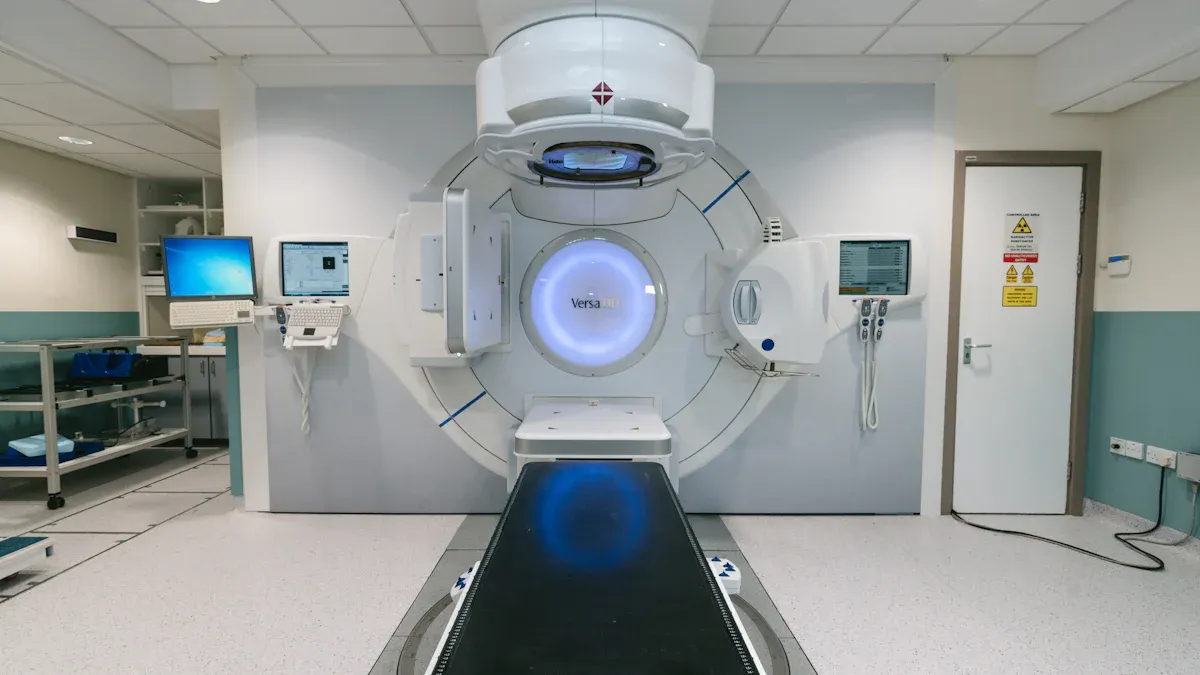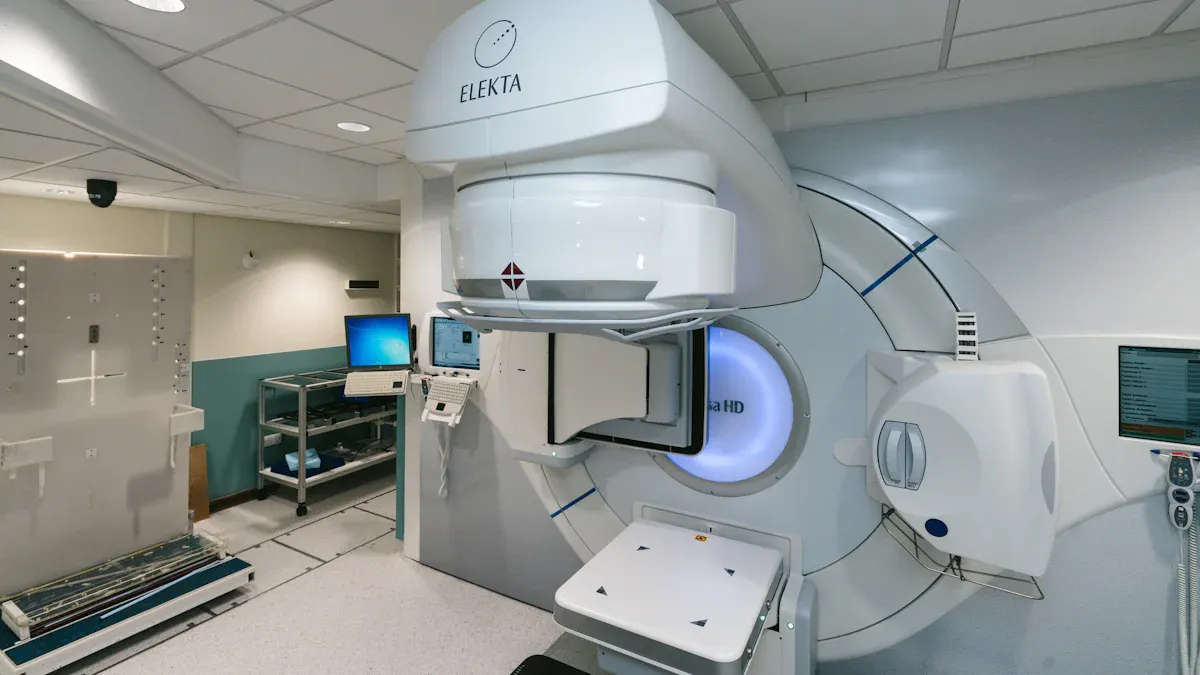Top Innovations in Cancer Treatment Transforming Lives in 2025

The year 2025 marks a turning point in cancer treatment. Researchers and medical professionals have introduced groundbreaking innovations that are saving lives and improving care. These advancements include cutting-edge therapies and diagnostic tools that offer patients better outcomes. Global Breakthroughs: The Latest Innovations in Cancer Research have paved the way for these life-changing developments. Patients now have access to more precise treatments and earlier detection methods, which increase survival rates and enhance quality of life. These innovations are reshaping the future of cancer care.
Key Takeaways
Custom cancer vaccines help by focusing on specific cancer traits. This leads to better results for patients.
Liquid biopsies use simple tests to find cancer early. Early detection helps save lives with quicker treatments.
AI tools make cancer care better by finding problems faster. They also create treatment plans based on patient needs.
Small treatment devices and online doctor visits bring care to homes. This makes it easier for patients to get treated.
Worldwide teamwork in cancer research creates new ideas. It solves tough problems and gives better treatments to people everywhere.
Revolutionary Treatment Approaches

Immunotherapy Advancements
Personalized cancer vaccines for tailored treatment
Personalized cancer vaccines are transforming immunotherapy by targeting unique markers, or neoantigens, on cancer cells. These vaccines are designed to stimulate the immune system to recognize and attack cancer cells while sparing healthy tissue. Recent studies highlight their potential, with clinical trials showing promising results. For instance, a Phase II trial of an mRNA pancreatic cancer vaccine reported that 50% of patients experienced no tumor recurrence after 1.5 years. This approach offers hope for more effective and individualized cancer treatments.
Next-generation immune checkpoint inhibitors
Immune checkpoint inhibitors have revolutionized cancer care by unleashing the immune system to fight tumors. Next-generation inhibitors are now being developed to enhance efficacy and reduce side effects. These advancements include combining checkpoint inhibitors with other therapies, such as personalized vaccines or CAR-T-cell therapy. A small study combining GVAX vaccines with immunotherapy demonstrated longer survival times, showcasing the potential of these innovative combinations.
Precision Medicine in Action
Genetic profiling for individualized therapies
Genetic profiling has become a cornerstone of precision medicine, enabling treatments tailored to a patient’s unique genetic makeup. By analyzing tumor DNA, researchers can identify actionable mutations and recommend targeted therapies. In a clinical trial involving pediatric patients with hard-to-treat cancers, genomic profiling identified actionable mutations in 5% of cases. Among those who received guided treatments, 83% showed improved outcomes, highlighting the power of this approach.
CRISPR-based therapies targeting specific mutations
CRISPR technology is redefining cancer treatment by allowing precise editing of genetic mutations that drive cancer growth. This revolutionary tool targets specific DNA sequences, correcting errors or disabling harmful genes. Advances in CRISPR-based therapies are paving the way for treatments that directly address the root causes of cancer, offering new hope for patients with previously untreatable conditions.
Targeted Therapies Redefined
Novel small molecule inhibitors for specific cancer types
Small molecule inhibitors are being developed to target specific proteins or pathways involved in cancer progression. These drugs are particularly effective for cancers driven by well-defined genetic mutations. For example, KRAS inhibitors have shown an 87% disease control rate and a 20% objective response rate in clinical trials, providing a lifeline for patients with limited options.
Antibody-drug conjugates (ADCs) for precision targeting
Antibody-drug conjugates (ADCs) combine the targeting ability of antibodies with the potency of chemotherapy drugs. This innovative approach delivers treatment directly to cancer cells, minimizing damage to healthy tissues. ADCs are gaining traction as a powerful tool in precision oncology, offering improved outcomes and fewer side effects for patients.
These revolutionary approaches, supported by Global Breakthroughs: The Latest Innovations in Cancer Research, are reshaping cancer care. They provide patients with more effective, personalized, and less invasive treatment options, improving survival rates and quality of life.
Early Detection and Diagnostic Innovations

Liquid Biopsies
Non-invasive blood tests for early-stage cancer detection
Liquid biopsies are revolutionizing cancer diagnostics by offering non-invasive blood tests that detect cancer at its earliest stages. These tests analyze biomarkers, such as circulating tumor DNA (ctDNA), to identify cancer-related changes in the bloodstream. The Carcimun® test has demonstrated exceptional accuracy, sensitivity, and specificity, effectively distinguishing cancer patients while minimizing false positives and negatives. Similarly, the TruBlood study, involving nearly 10,000 participants, reported a sensitivity of 93%, showcasing its strong potential for early detection. These advancements are enabling earlier interventions, which significantly improve patient outcomes.
Monitoring treatment response with circulating tumor DNA (ctDNA)
Liquid biopsies also play a critical role in monitoring treatment response. By tracking ctDNA levels, doctors can assess how well a therapy is working and make timely adjustments. This approach provides a less invasive alternative to traditional biopsies, reducing patient discomfort while delivering real-time insights into treatment effectiveness.
AI Applications in Cancer Care
AI-driven diagnostic imaging for enhanced accuracy
Artificial intelligence is transforming cancer diagnostics by improving imaging accuracy. AI-powered tools, such as dual-modality imaging that combines PET and CT scans, provide better disease assessment. Simulated Raman scattering offers high-resolution imaging for brain tumors, while machine learning models analyze gene expression from thousands of tumor samples to identify survival-linked targets. These technologies enhance diagnostic precision, leading to more effective treatment plans.
Predictive analytics for personalized treatment planning
AI also excels in predictive analytics, helping doctors create personalized treatment plans. For example, AI models can predict lung and breast cancer years before diagnosis, enabling earlier interventions. Multimodal data analysis further supports tailored care by integrating diverse data sources, such as imaging and genetic information, to guide decision-making.
Advanced Imaging Technologies
High-resolution imaging for detailed tumor mapping
Advanced imaging technologies, such as improved MRI scanners and image processing techniques, provide detailed tumor mapping. Multi-modal imaging, which combines structural and functional imaging, enhances diagnosis and treatment planning. These innovations allow doctors to visualize tumors with unprecedented clarity, aiding in precise surgical and therapeutic interventions.
Real-time imaging during surgical procedures
Real-time imaging during surgery is another breakthrough. Functional imaging helps surgeons understand brain activity in relation to tumor presence, ensuring safer and more effective procedures. Machine learning further refines tumor segmentation and prognosis evaluation, improving outcomes for patients.
These diagnostic innovations, supported by Global Breakthroughs: The Latest Innovations in Cancer Research, are transforming cancer care. They enable earlier detection, more accurate diagnoses, and personalized treatment strategies, offering new hope for patients worldwide.
Patient-Centric Treatment Delivery
Faster and More Accessible Treatments
Seven-minute cancer treatment injections
Innovations in cancer treatment delivery are significantly improving patient experiences. The NHS has introduced a groundbreaking seven-minute injection method for administering cancer treatments. This approach reduces the time required for treatment from an hour to just minutes, enhancing efficiency and minimizing patient discomfort. By streamlining the process, healthcare providers can treat more patients in less time, addressing the growing demand for accessible cancer care. This method also aligns with ongoing efforts to make treatments less invasive and more patient-friendly.
Portable treatment devices for home-based care
Portable treatment devices are transforming cancer care by enabling patients to receive therapies in the comfort of their homes. These devices, designed for ease of use, allow patients to manage their treatment schedules without frequent hospital visits. For individuals with mobility challenges or those living in remote areas, this innovation provides a lifeline. By reducing the need for travel, portable devices improve accessibility and empower patients to take an active role in their care.
Improved Accessibility to Care
Telemedicine for remote consultations and follow-ups
Telemedicine is revolutionizing cancer care by connecting patients with specialists regardless of geographic barriers. Through virtual consultations, patients can access expert advice and follow-up care without leaving their homes. This approach reduces travel-related stress and costs, particularly for those in rural or underserved areas. Telemedicine also facilitates timely interventions, ensuring that patients receive the care they need when they need it.
Global initiatives to reduce disparities in cancer care
Efforts to address disparities in cancer care are gaining momentum worldwide. Programs like the Cancer Vaccine Launch Pad in England aim to provide thousands of patients with access to innovative treatments, such as personalized cancer vaccines. These initiatives focus on reducing inequities in healthcare by making cutting-edge therapies available to all, regardless of socioeconomic status or location. By prioritizing inclusivity, global breakthroughs in cancer research are helping to bridge the gap in treatment accessibility.
Enhancing Patient Comfort and Support
Integrative therapies for managing side effects
Integrative therapies are playing a vital role in improving the quality of life for cancer patients. Techniques such as acupuncture, yoga, and mindfulness are being used to alleviate side effects like nausea, fatigue, and anxiety. These therapies complement traditional treatments, offering holistic care that addresses both physical and emotional well-being. Patients report feeling more empowered and resilient, highlighting the importance of a comprehensive approach to cancer care.
Digital tools for patient education and emotional support
Digital tools are enhancing patient education and emotional support by providing easy access to reliable information and resources. Mobile apps and online platforms offer personalized guidance, helping patients understand their diagnosis and treatment options. Virtual support groups and counseling services connect patients with others facing similar challenges, fostering a sense of community. These tools empower patients to make informed decisions and navigate their cancer journey with confidence.
Patient-centric innovations, supported by Global Breakthroughs: The Latest Innovations in Cancer Research, are transforming cancer care. By prioritizing accessibility, comfort, and support, these advancements are improving outcomes and enhancing the overall experience for patients worldwide.
Global Breakthroughs: The Latest Innovations in Cancer Research
Ongoing Research and Clinical Trials
Promising therapies advancing through clinical trials
Clinical trials continue to drive progress in cancer treatment, offering hope for patients worldwide. Recent studies have highlighted the effectiveness of new therapies. For example:
Therapy Type | Study Name | Key Findings |
|---|---|---|
Chemotherapy | NAPOLI-3 | NALIRIFOX outperformed gemcitabine plus nab-paclitaxel in metastatic pancreatic cancer. |
Chemotherapy | JCOG1611-GENERATE | Gemcitabine plus nab-paclitaxel showed better survival and safety compared to FOLFIRINOX. |
Cancer Vaccines | mRNA Vaccines | Over 120 trials demonstrate potential against various cancers, utilizing COVID-19 vaccine technology. |
These findings underscore the importance of ongoing research in improving treatment outcomes. Conferences like ASCO GI 2023 and the AACR Special Conference on Pancreatic Cancer have also provided platforms for researchers to share groundbreaking developments, fostering collaboration and innovation.
Collaborative global efforts in cancer research
Global collaboration has become a cornerstone of cancer research. Researchers from different countries are pooling resources and expertise to accelerate progress. Initiatives like the Cancer Moonshot program and the International Cancer Genome Consortium exemplify this collective effort. By working together, scientists can tackle complex challenges, such as drug resistance and rare cancer types, more effectively. These partnerships are paving the way for transformative advancements in cancer care.
Anticipated Advancements Beyond 2025
Emerging technologies like spatial transcriptomics
Emerging technologies hold immense promise for the future of cancer treatment. Spatial transcriptomics, for instance, allows researchers to map gene activity within tumors at an unprecedented level of detail. This technology could lead to more precise therapies by identifying how cancer cells interact with their environment. Experts predict that such innovations will revolutionize the understanding of tumor biology, enabling the development of highly targeted treatments.
Big data analytics shaping the future of cancer care
Big data analytics is set to play a pivotal role in cancer care. By analyzing vast amounts of patient data, AI models can predict cancer risk and personalize treatment plans. Experts like Regina Barzilay emphasize the potential of AI in screening and prevention, which could significantly improve early detection rates. Additionally, advancements in precision medicine, such as mutant-specific inhibitors, are expected to address previously untreatable cancers. These breakthroughs highlight the transformative impact of technology on cancer research and treatment.
The global breakthroughs in cancer research are not only advancing current therapies but also laying the groundwork for future innovations. By combining cutting-edge technology with collaborative efforts, researchers are shaping a future where cancer care is more effective and accessible.
The innovations of 2025 have redefined cancer treatment, offering patients and their families new hope. These advancements have improved survival rates and enhanced the overall experience of care. Recent data highlights the significant progress made in this field:
Metric | Value |
|---|---|
13 | |
Different Drugs | 10 |
Types of Cancer | 11 |
Research Papers Published | 381 |
Grants Awarded | 64 |
Institutions Involved | 42 |
Countries Participating | 7 |
Funding Amount | $22,765,861 |
Eligible Patients for Immunotherapy | 45% |
These breakthroughs are not only saving lives but also transforming the way cancer care is delivered. As research continues to advance, the future holds even greater promise. Emerging technologies and global collaborations inspire optimism for a world where cancer treatment becomes more effective and accessible for all.
FAQ
What is the most promising innovation in cancer treatment in 2025?
Personalized cancer vaccines stand out as a groundbreaking innovation. These vaccines target unique markers on cancer cells, enabling tailored treatments. Clinical trials have shown significant success, offering hope for more effective and individualized therapies.
How do liquid biopsies improve cancer detection?
Liquid biopsies use non-invasive blood tests to detect cancer early. They analyze biomarkers like circulating tumor DNA (ctDNA) to identify cancer-related changes. This method allows for earlier interventions, improving survival rates and reducing the need for invasive procedures.
Can AI help in cancer treatment planning?
Yes, AI enhances treatment planning by analyzing patient data. Predictive models identify cancer risks and recommend personalized therapies. AI also improves diagnostic accuracy, ensuring patients receive the most effective care based on their unique needs.
Are there new ways to make cancer treatments more accessible?
Portable treatment devices and telemedicine are improving accessibility. Patients can now receive therapies at home or consult specialists remotely. These innovations reduce travel burdens and make care available to underserved populations.
What role does global collaboration play in cancer research?
Global collaboration accelerates cancer research by pooling resources and expertise. Initiatives like the Cancer Moonshot program unite scientists worldwide to tackle challenges like drug resistance. These efforts drive innovation and improve treatment outcomes for patients everywhere.
See Also
An In-Depth Overview of Various Cancer Types
Recognizing Symptoms and Treatment Options for Duodenal Cancer
Key Features and Insights About Cholangiocarcinoma

